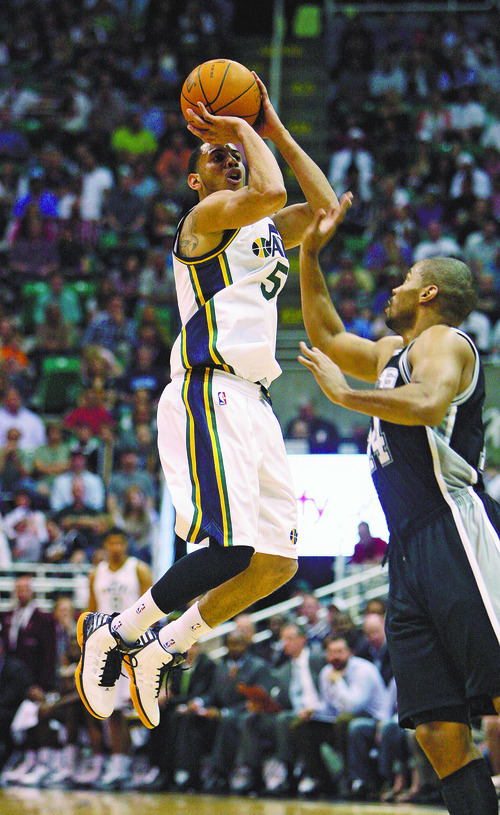This is an archived article that was published on sltrib.com in 2012, and information in the article may be outdated. It is provided only for personal research purposes and may not be reprinted.
Even though Jazz alumni John Stockton and Greg Ostertag were in the building Monday night, the team chose not to employ them.
That was only fair, considering San Antonio left Tim Duncan, Tony Parker and Manu Ginobili at home, resting.
Yet instead of this game becoming some kind of joke, the Jazz managed to make winning feel like an achievement. When the Jazz rallied from eight points down in the last nine minutes to rescue a 91-84 victory at EnergySolutions Arena, the sellout crowd cheered like crazy.
That's what avoiding complete embarrassment will do for you, I guess.
This was about to become one of the worst losses in the Jazz's recent history, basically knocking them out of the playoff race and undoing much of the good they've done this season. As it turned out, they used a 24-9 closing run that featured guard Devin Harris' 12 points to subdue this version of the Spurs, ending San Antonio's 11-game winning streak.
"The guys just toughed it out," said Jazz coach Tyrone Corbin, with obvious relief.
Asked what he was thinking during the fourth quarter, Harris said, "We've been in worse position before."
Not with this much potential shame, though. Falling to the Spurs under these circumstances would have rivaled the Jazz's April 2009 loss to Golden State's bunch of misfits.
Even in the Jazz's injury-weakened condition, Corbin had Paul Millsap, Derrick Favors, Al Jefferson, Gordon Hayward and Harris on the floor at the end against Matt Bonner, Danny Green, Tiago Splitter, Stephen Jackson and Gary Neal.
The Jazz finally took control of this thing, after a mostly flat performance that Corbin partly attributed to San Antonio's altered lineup. "It throws you off a bit," Corbin said.
Otherwise, the Jazz appreciated the gift.
In February, one night after beating the Jazz for an 11th straight win, Spurs coach Gregg Popovich rested Duncan and Parker in Portland (Ginobili was injured). The result: a 40-point loss.
This game was nothing like that one. If not for 26-percent shooting in the fourth quarter, the Spurs might have won.
I have absolutely no problem with Popovich's approach to the skewed schedule during this lockout-shortened season, choosing to value his players' fitness over playoff seeding. Yet there's no ignoring how his move resonated throughout the Western Conference and elsewhere in the NBA.
The happy: The team that stands to gain a first-round draft pick if the Jazz make the playoffs (Minnesota), the teams battling with San Antonio for the NBA's best record (Miami, Chicago and Oklahoma City) and fans supporting the Jazz's playoff push, although they gained little ground Monday.
The unhappy: The teams competing with the Jazz for the West's last three playoff spots (Houston, Dallas, Denver and Phoenix) and ticket-buyers hoping to watch the Spurs' Big Three in action. Popovich obviously was not going to satisfy everybody, not that he's terribly concerned about outside opinions. The move was "pretty much a no-brainer, if you look at our schedule," he said.
The Spurs play 11 games in the last 16 days of the season, beginning Wednesday. Asked when he decided on Monday's strategy, Popovich said, "When the schedule came out."
Even so, there would be no concession from the Spurs. The Jazz needed Harris' surge, Millsap's spectacular, one-handed dunk of a rebound high above the rim and the team's five blocked shots in the fourth quarter to overtake San Antonio.
Significant injuries to Earl Watson and C.J. Miles will make the final push more difficult for the Jazz. Judging by Monday's struggle, they seem to like it that way.
Twitter: @tribkurt



